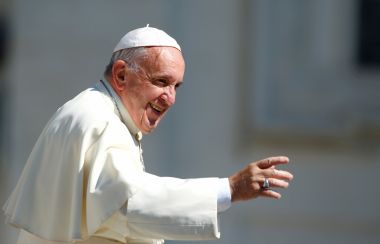Pope Francis: I often have a 'crisis of faith'

Even Pope Francis has had doubts about the Christian faith, he admitted to a group of young people in Rome on Saturday.
The Pope was responding to a question about whether the suffering of people around the world, including Christians, had ever caused him to have a "crisis of faith".
"Many times I find myself in a crisis of faith," Francis replied during a Q&A at the Villa Nazareth University College. "Sometimes I've questioned Jesus: 'But why do you allow this?'"
He has had these thoughts as "a boy, a seminarian, a religious, a priest, a bishop and even now Pope", he admitted, according to Crux.
A Christian who "hasn't doubts, who hasn't had a crisis of faith, is a Christian who's missing something," he added. "He's a Christian who settles with a bit of worldliness and goes through life like this".
During the same session, the Pope said the systematic killing of Christians in the Middle East is "cruel martyrdom", and to brand it a genocide is "reductionism".
"The tragedy of the Christian community around the world... it's true," he said. "But this is the destiny of a Christian. Giving witness is a difficult situation. I don't like it when [some] speak of a Christian genocide in the Middle East: it's a reductionism.
"The truth is a persecution which leads Christians to have fidelity to the consistency of their faith."
He referred to martyrdom as "a mystery of faith" and a "gift of the Holy Spirit", but added that it is not only through death that Christians are able to testify to their belief in Christ.
"There's the martyrdom of blood for Christians, but also the martyrdom of the every day, the martyrdom of honesty in this world."
It takes courage, he said, "not to be ashamed of being seen as a Christian".
Pope Francis is not the only Christian leader to admit to having questioned their faith in times of crisis.
Following the terror attacks in Paris last November, the Archbishop of Canterbury generated a media storm when it was widely reported that he'd said he had doubted the existence of God.
In an interview with the BBC's Songs of Praise, Archbishop Justin Welby said: "Saturday morning [the day after the attacks], I was out and as I was walking I was praying and saying: 'God, why – why is this happening? Where are you in all this?' And then engaging and talking to God."
"Yes, I doubt," he admitted.
However, he later clarified in a blog post: "I was asked whether events like Paris ever caused me to doubt and question.
"Foolishly, I said exactly what I thought, in a fairly lengthy discussion which particularly referred to Psalm 44.
"The essence of my answer was that everyone has moments when they question things, and one sees that in the Psalms. The psalmist in Psalm 44 asks God if he is asleep, and challenges him in the most direct terms about his failure to deliver Israel. It is a psalm of protest.
"When there are tragedies like Paris, when friends suffer, when evil seems to cover the face of the Earth, then we should be like the psalmist.
"But that is not the same as a settled belief that God does not exist, or even any serious questioning about his reality. It's a moment of protest and arguing."
The Archbishop said that this was "very much part of my normal prayer life, together with praise and wonder, with delight and awe, with petition and lament, with celebration and rejoicing".











